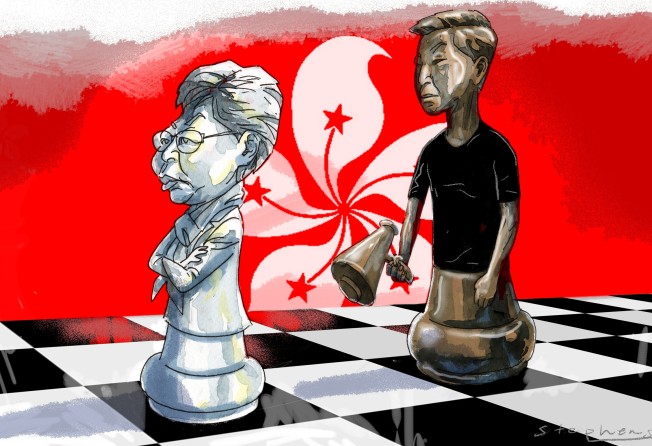Why any dialogue with protesters is a non-starter as long as Carrie Lam insists on preconditions
- Carrie Lam’s insistence that violence must end before dialogue with the protesters can begin won’t work, because there is no individual or group in a leading position capable of controlling all the protesters

Hong Kong Chief Executive Carrie Lam Cheng Yuet-ngor’s welcome emergence from self-imposed purdah does not yet signal the adoption of a positive strategy to stop the protests by meeting the demonstrators halfway. Instead, we are seeing public relations gambits like the unannounced visit to a local market and press conferences where she does little more than double down on her refusal to budge on key demands and one-sided criticism of the protesters.
Meanwhile, people are starting to listen more to (and learn more from) China’s policy statements than to those emanating from Government House.
In place of a strategy, we see a commitment to do Beijing’s bidding in using heavy-handed police tactics to crack down on the demonstrations. The underlying presumption is that life will gradually return to normal as the protesters become exhausted and lose public support.
Beijing can flex its muscles with police and military exercises across the border, safe in the knowledge that its ultimate threat of direct intervention will not have to be put into practice because it will be a strong enough spur to the Hong Kong police to use increasing violence to crush dissent.
This is a possible scenario. But it is not an acceptable one. Even if the demonstrations peter out – and, with the airport shutdown on Monday, this does not appear an immediate prospect – the five demands will not disappear. The problems that everyone knows underlie the current discontent (unaffordable housing, low pay, lack of democracy) will persist, surging back up in more waves of protest in the future.
Lam says she wishes to engage with young people, which is a good start, but she then insists that the first priority is to stop the violence. Both of those are desirable objectives, but her refusal to talk directly to her opponents, coupled with her statement that it would not be good to make concessions in response to the protests, means that she is not prepared to start a genuine dialogue at this stage. This policy is misguided.
I recall reading several decades ago the advice of Henry Kissinger that negotiations should not be blocked by preconditions. Unrealistic? In some cases, maybe so. It depends on the circumstances. I think it applies strongly in Hong Kong right now.
In a 2009 article in Foreign Affairs magazine, Deepak Malhotra looks at conflicts in which one side refuses to talk until a precondition – usually the cessation of violence – has been met and suggests helpful criteria for determining whether to set such a precondition.
“On the one hand,” he says, “failing to set preconditions when they are useful can undermine the effectiveness of a negotiating strategy. On the other hand, preconditions that are ill-conceived may eliminate the prospect of diplomatic engagement.”
He suggests that two criteria must be met for deciding whether preconditions are appropriate. First, the opponent must be capable of meeting them; second, meeting the preconditions will not weaken the opponent’s future leverage.
The conflicts from which Malhotra draws this lesson are all ones that have reached a far more destructive stage than that in Hong Kong today: the “troubles” in Northern Ireland, the civil war in Sri Lanka and the Middle East conflict. But this principle holds just as strongly in Hong Kong – and no sane person would want to wait until thousands had died before considering negotiations.
I would contend that the first of these criteria is not satisfied, so the Hong Kong government should set no preconditions for negotiating on the five demands.
Granted, the demonstrators have shown great coordination and organisation. Two million people marched through the centre of Hong Kong in June and left no damage or litter. The smaller protests since then have involved sophisticated logistics and supply chains. But there is no individual or group in a leading position capable of controlling all the protests.
So it makes no sense whatsoever to await an order by this nonexistent opposition leadership to rein in the violence before agreeing to talk, as that would delay dialogue indefinitely. Better to recognise that most protesters, including most recently lawyers and civil servants and hospital staff, have conveyed their message peacefully.
There have been numerous good proposals in the Post for bringing together the government and its opponents in a constructive dialogue. And there are many of us with experience in conflict resolution who would be prepared to help make it work.
It is never too late to start this process, but the sooner the government abandons the ill-thought-out strategy of relying solely on police attrition and initiates the dialogue, the higher the chances of success and of avoiding needless bloodshed and economic damage.
Ken Davies is former chief economist, Asia, and Hong Kong bureau chief for the Economist Intelligence Unit (EIU) in Hong Kong and chief China economist with the EIU in London. He then worked for the OECD, helping China to develop open policies towards investment